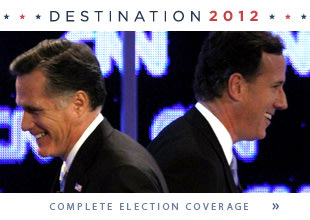http://www.yahoo.com/_ylt=Att43L0vzpLiRivxS6VtOaGbvZx4;_ylc=X3oDMWEwaWVyZTMzBF9TAzIwMjM1MzgwNzUEYQMxMjA0MTYgbmV3cyBibG9nIHJvbW5leSB2cHMgdARjY29kZQNwemJ1ZmNhaDUEY3BvcwMzOARlZAMxBGcDaWQtMjIyMDI0NwRpbnRsA3VzBGl0YwMwBGx0eHQDUm9tbmV5JiMzOTtzdG9wVlBwcm9zcGVjdHMEbWNvZGUDcHpidWFsbGNhaDUEbXBvcwMxBHBrZ3QDMQRwa2d2AzkEcG9zAzAEc2VjA3RkLWZlYQRzbGsDdGh1bWJsaW5rBHRhcgNodHRwOi8vbmV3cy55YWhvby5jb20vYmxvZ3Mvc2lnbmFsL3JvbW5leS10b3AtZml2ZS12aWNlLXByZXNpZGVudGlhbC1ub2RzLXBvdGVudGlhbC10aW1lLTE5NTMzOTA3OC5odG1sBHRlc3QDNzAx/SIG=13r6qf67u/EXP=1334781147/**http%3A//news.yahoo.com/blogs/signal/romney-top-five-vice-presidential-nods-potential-time-195339078.html Romney’s top-five vice presidential nods: Who’s the potential time bomb?

By
David Rothschild |
The Signal – Mon, Apr 16, 2012
 Click image to see more photos (AP/Scott Applewhite, File)
Click image to see more photos (AP/Scott Applewhite, File)
Now that the race for the Republican nomination is effectively over, Mitt Romney's campaign is
speaking publicly about who they might choose as his running mate. While the prediction markets we rely on for forecasting elections also take action on vice-presidential nominees, this is a different type of race, decided by a small council of insiders rather than an election or caucuses. The current frontrunner in the prediction market data is Marco Rubio, the first term senator from Florida.
A presidential candidate has two political priorities for his second-in-command: That the candidate helps and that the candidate does not hurt. For Romney, this breaks down as follows: A candidate can help by providing the former Massachusetts governor cover from the right, recruiting some votes from the center or left, or by helping capture the candidate's home state or region. A candidate can hurt Romney by overshadowing the campaign, either with questions about his or her fitness for the top office--see
Quayle and
Palin--or by causing a scandal of some degree. Reaching a bit farther back, one can recall
Thomas Eagleton of Missouri throwing the 1972 McGovern ticket into total chaos when it was revealed he was treated with shock therapy for depression and possibly an alcoholic.
Let's look at who leads in the market and their individual potential for helping or harming Romney's chances.
Marco Rubio is 23.2 percent likely to gain the nod from Romney, an extremely high likelihood for a race categorized by uncertainty. He would provide cover for Romney from the right and he could possibly draw Latino supporters from the center or left (he's Cuban-American). On the other hand, he does not have much experience in the public spotlight and arguably has a few small skeletons in his closet that have come to light as
the media has begun to scrutinize him.
The Signal take on Rubio: Big potential upside with medium potential downside.
Rob Portman, also a freshman senator from another big swing state (Ohio), follows Rubio with a 12.8 percent likelihood. Of the people listed in this article, he is probably the least well-known. In endorsing Portman for the job, the Ohio Dispatch refers to him as "
safe and sensible." Their argument is that he is a reliable conservative but does not scare moderates and liberals. He would provide cover for Romney from arch-conservatives and his longer track record of solid, non-confrontational public service should make him safe not to embarrass the campaign.
Portman: medium potential upside with low potential downside.
Chris Christie, governor of New Jersey, follows in third place with 10.8 percent likelihood. As a moderate Republican, Christie could help Romney with moderate voters, but will provide no cover from the right. Further, his combative style will be risky when the media and opposition research
film him day in and day out. Attacks on constitutes may play well at times with constituents, but is not what a presidential campaign wants to dominate its nightly coverage.
Christie: medium potential upside with medium/high potential downside.
Bob McDonnell, governor of Virginia, is in fourth place with 7.3 percent likelihood. Prior to mid-February, McDonnell looked like a better-known Portman in a similarly large swing state. Then he backed, and then ultimately withdrew his support, for a bill that would require all women seeking an abortion in an early stage to receive an
ultrasound requiring a vaginal probe. If Romney chooses him as his running mate, this debate will become central to the campaign and, due to his
sinking poll numbers among educated women, it is fight that the Romney campaign does not want to wage.
McDonnell: medium potential upside with medium potential downside.
Paul Ryan is in fifth place with 5.8 percent likelihood. In one sense, the congressman from Wisconsin is already running with Romney, as the media ties Romney to Ryan's
polarizing budget proposals. The proposals consistently call for massive tax and spending cuts, with deficit reduction to come from unnamed closes in the tax loopholes. Ryan provides Romney cover from the right and possibility some centrist support. But he risks massive alienation from the left and would overshadow Romney, as the media might defer to him as the more
consistent ideas guy. This is a risky place to put a presidential candidate seen as a bit
short of consistent ideas.
Ryan: medium potential upside with medium potential downside.
 Anyone else
Anyone else represents nearly a 50 percent likelihood. Recent nominations such as Palin were hard to anticipate a few months away, and we should not discount that possibility again this year.
Follow along in real-time on PredictWise for
Republican vice-presidential nomination odds.
David Rothschild is an economist at Yahoo! Research. He has a Ph.D. in applied economics from the Wharton School of Business at the University of Pennsylvania. Follow him on Twitter @DavMicRot and email him at thesignal@yahoo-inc.com.